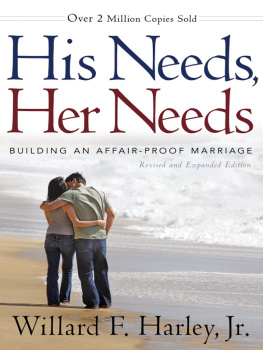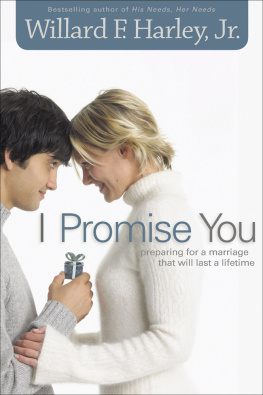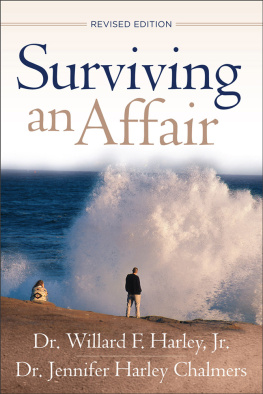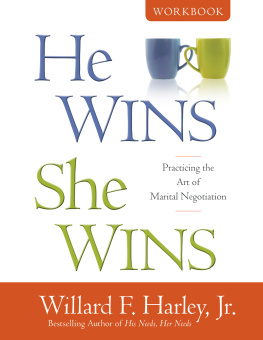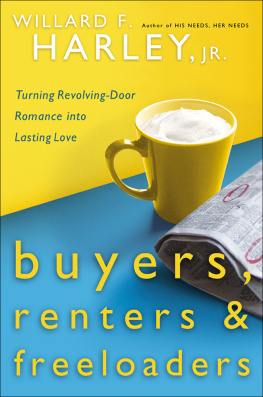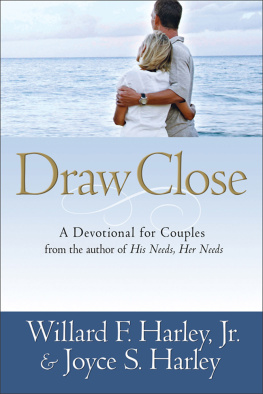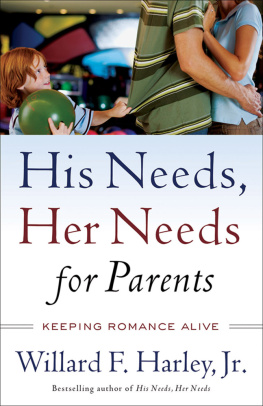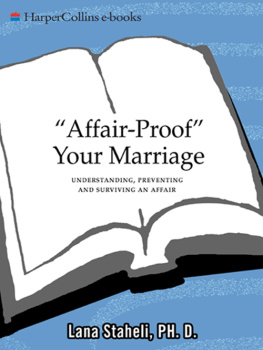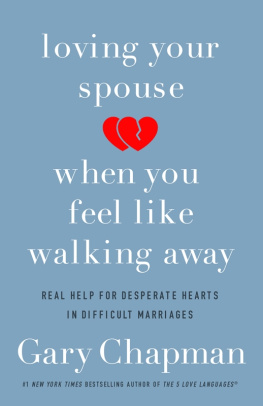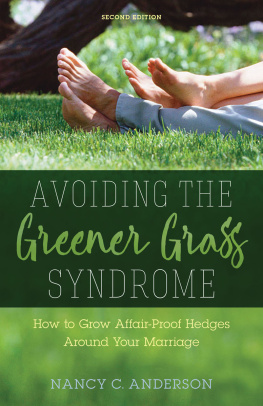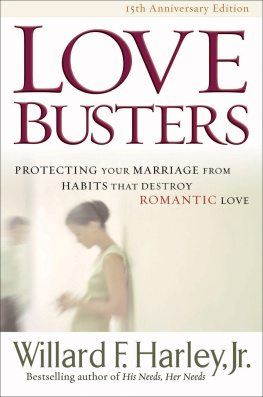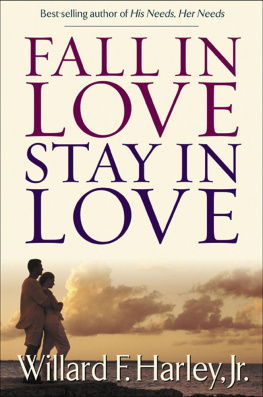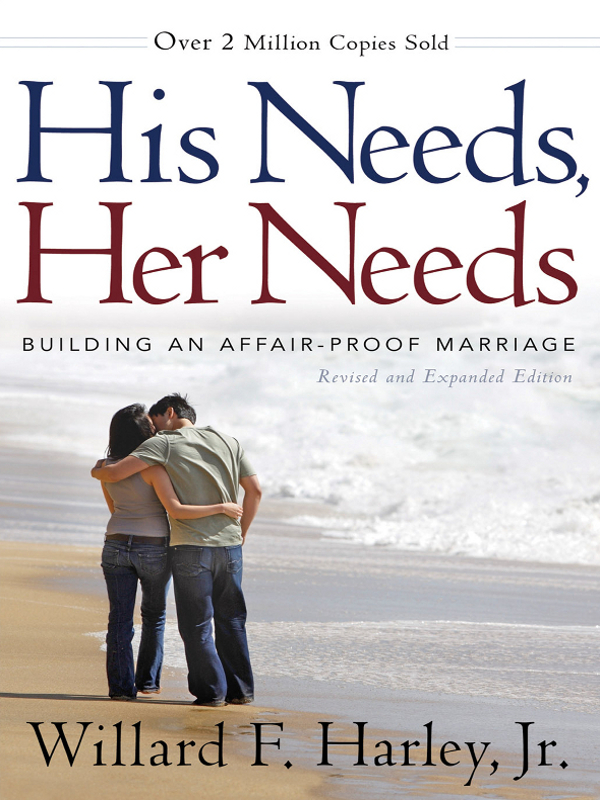
Revised and Expanded Edition
His Needs,
Her Needs
BUILDING AN AFFAIR-PROOF MARRIAGE
Willard F. Harley, Jr.
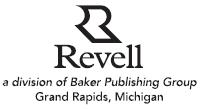
1986, 1994, 2001, 2011 by Willard F. Harley, Jr.
Published by Revell
a division of Baker Publishing Group
P.O. Box 6287, Grand Rapids, MI 49516-6287
www.revellbooks.com
E-book edition created 2010
All rights reserved. No part of this publication may be reproduced, stored in a retrieval system, or transmitted in any form or by any meansfor example, electronic, photocopy, recording without the prior written permission of the publisher. The only exception is brief quotations in printed reviews.
ISBN 978-1-44123-369-1
Library of Congress Cataloging-in-Publication Data is on file at the Library of Congress, Washington, DC.
Scripture quotations are from the Holy Bible, New International Version . NIV. Copyright 1973, 1978, 1984 by Biblica, Inc. Used by permission of Zondervan. All rights reserved worldwide. www.zondervan.com
To Joyce
my one and only
Contents
In 1978 I was asked to teach a thirteen-week course on marriage at the church I attended. The topic was: what must a couple do to stay happily married? The Christian Education Director tape-recorded the course for me.
Over the next few years, I used those tapes in my counseling practice to support the advice that I gave couples. One couple volunteered to transcribe the tapes so that I could give them to other couples in written form.
In 1984 that rough transcription made its way into the hands of an employee of the Fleming H. Revell Publishing Company, that person passed it on to the acquisitions editor, and the rest is history. It was published in 1986 with the title His Needs, Her Needs: Building an Affair-ProofMarriage.
Within two years of its first printing, it became a bestseller and continues to be one of the most popular books on marriage right up to this year. Its been translated into twenty-two languages and more than three million copies have sold worldwide.
Finding a publisher for this book was the easy partit almost fell into my lap. The hard part had been finding the answer to the question, what must a couple do to stay happily married?
Learning What Makes Marriages Succeed
When I was nineteen, a married acquaintance in college told me his marriage was in trouble and asked for my advice. The advice I gave did not helphis marriage ended in divorce. But my friends marital failure started me thinking. What was wrong with the advice I gave? What makes some marriages succeed, and others, like my friends, fail?
It was 1960, and I was about to witness something that few expected the beginning of the end of the traditional nuclear family in America. Evidence of this social disaster accumulated over the next twenty years. The divorce rate climbed from about 10 percent to over 50 percent, and the percentage of single adults would go from 6.5 percent to 20 percent. While the divorce rate finally stabilized at about 45 percent in 1980, the percentage of single adults has continued to increase right up to the present. It is currently at about 50 percent and climbing because fewer and fewer people are willing to commit themselves to one partner for life.
At the time, I didnt know that my friends marital failure was part of a trend that was about to overwhelm nuclear families. I was unaware of new cultural forces that would threaten marriages as never before. Marriage counselors had it easy prior to that time because people simply didnt divorce, regardless of how unhappy they were. But now, they were unwilling to tolerate a failed marriage. So if a marriage was to be saved, a counselor had to know what made marriages succeed. At the age of nineteen, I certainly did not have that answer.
Over the next few years, couples continued asking for my advice regarding marriageespecially after I earned a PhD degree in psychology. But I wasnt any more successful with them than I had been with my friend years earlier.
So I decided to become a marriage expert. I enrolled in a two-year internship at a clinic that had one of the best reputations for marital therapy. I read books written by the most prominent marital theorists and practitioners, was supervised by the chairman of the University of Minnesotas Department of Family Social Science, and learned the latest techniques in helping spouses communicate with respect and understanding. But even after helping couples learn to communicate effectively, I was still unable to save their marriages. Almost everyone who came to me for help ended up like my college frienddivorced.
In my effort to become a marriage expert, though, I made a crucial discovery. I wasnt the only one failing to help couples. Almost everyone else working with me in the clinic was failing as well! My supervisor was failing, the director of the clinic was failing, and so were the other marriage counselors who worked with me.
And then I made the most astonishing discovery of all. Most of themarital experts in America were also failing. It was very difficult to find anyone willing to admit his or her failure, but when I had access to actual cases, I couldnt find any therapist who could prove that the counseling provided was any better than no counseling at all.
Many of these experts didnt even know how to make their own marriages work. Many had been divorced themselvesseveral times.
Marital therapy had the lowest success rate of any form of therapy at that time. In one 1965 study I read, less than 25 percent of those surveyed felt that marriage counseling did them any good whatsoever, and a higher percentage felt that it did them more harm than good. It seemed that marriage counseling made couples more likely to divorce.
What a challenge! Marriages were breaking up at an unprecedented rate, and no one knew how to help. So I stopped looking for answers from books, clinics, and experts, and started looking for them from those who came to me for answerscouples about to divorce.
I listened to spouses explain to me why they were ready to throw in the towel. I asked them, What do you think it would take for you to be happily married again?
The answer that came back to me was almost too simple to believe. Couple after couple explained to me that they married each other because they found each other irresistiblethey were in love. But by the time they came to my office, they had lost that feeling for each other. In fact many were finding each other downright repulsive. When I asked them, What would it take for you to be happily married again? most couldnt imagine that ever happening. But when I persisted and couples were able to reflect on my question, the answer I heard repeated over and over was, for us to be in love again.
If I wanted to save marriages, I would have to learn how to restore the feeling of love.
Discovering How to Restore Romantic Love
My background as a psychologist taught me that learned associations trigger most of our emotional reactions. Whenever something is presented repeatedly with a physically induced emotion, it tends to trigger that emotion all by itself. For example, if someone flashes the color blue and gives you an electric shock and then flashes the color red and gives you a soothing back rub, eventually the color blue will tend to upset you and the color red will tend to relax you.
Applying the same principle to the feeling of love, I theorized that it might be nothing more than a learned association. If someone of the opposite sex were to be present often enough when I was feeling particularly good, the persons presence in general might be enough to trigger an incredibly good feelingromantic love.
Next page
